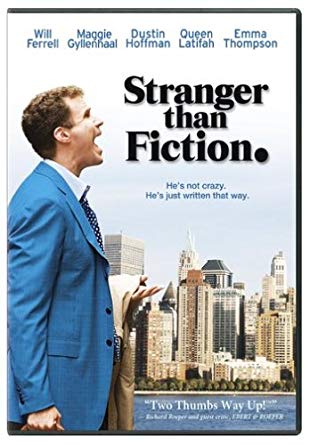Last weekend, my friend and I went to see Stranger than Fiction. He started telling me about it by warning me it was a Will Ferrell movie but I should like it because it was about a writer. I’d already heard about it from a fellow writer, who had asked, “If what you wrote became true, would that change what you wrote?”
This post contains affiliate links; as an Amazon associate, I earn a small commission on qualifying purchases.
 Stranger than Fiction: the plot
Stranger than Fiction: the plot
For those of you who haven’t seen the movie, Stranger than Fiction is about IRS agent Harold Crick (played by Will Ferrell). He’s the main character in a story written by Karen Eiffel (Emma Thompson), a British author. Harold begins to hear Karen’s voice in his head, narrating everything he’s doing. Karen, meanwhile, is trying to figure out how to kill Harold to end her book.
When Harold hears this, he becomes desperate and goes to a university English professor (Dustin Hoffman) to find out how to prevent his death. The professor helps Harold figure out who is narrating his story, and Harold finds Karen and asks her not to kill him. She’s already written the ending, however, and just has to type it. She gives him the manuscript. The professor reads it and tells Harold this is Karen’s best novel yet, her masterpiece, and Harold must die.
Harold himself then reads it, and returns it to Karen telling her it’s a great book. He goes through the next few days, willing to end the story as Karen had written it. However, having met Harold, Karen can’t stand the thought of killing him. She rewrites the ending of the novel, saving Harold in the nick of time.
What a thoughtful film this is, and how thought-stirring. Marc Forster‘s Stranger Than Fiction comes advertised as a romance, a comedy, a fantasy, and it is a little of all three, but it’s really a fable, a “moral tale”… ~ Robert Ebert
My thoughts on Stranger than Fiction
First, my friend was right. I think Stranger than Fiction is the one and only Will Ferrell movie I actually like. Will does a great job of playing Harold Crick, without his usual slapstick / stupid humour (which I don’t like). Emma Thompson is one of my favourite actresses, and I love the way she portrays Karen’s transformation. Stranger than Fiction also provides a lot of food for thought…
One thing I noticed was that Karen was a wreck when trying to kill Harold. She smoked. Her hair was messy. She couldn’t concentrate. Her thoughts were dark, destructive, disastrous, as she mentally acted out various scenes of death. She wasn’t a happy lady, but rather one desperate to finish her work to satisfy her publisher.
When she rewrites the ending, she comes into the professor’s office a completely different lady. Her hair is neatly combed, she’s wearing a suit, and everything about her says she’s calm and happy. She knows that because of how she’s changed the ending, this novel may not be her best work; but she isn’t killing someone, so she’s happy with that.
It is arguably the best movie about writer’s block, dramatic irony, fate, the unknowability of death, and the gray space between what is “real” and what is fiction. ~ Literary Hub
I started discussing Stranger than Fiction with my fellow writer. She said, “If what you wrote came true, would you still put your characters through whatever turmoil you currently write for them? I thought about it for myself and decided, yes, I still would [because] I can see where they’re going even if they can’t. I know the happy ending that I’ve written for them. Then I thought about God and why good things happen to bad people and was very grateful that it was Him, not myself, who was responsible for the most perfect ending of all.”
She got me thinking about the God-aspects of Stranger Than Fiction. In a way, Karen is like God to Harold. She has control over his life, the ability to write what happens to him. She also knows the complete story and the best way to end it – the overall picture Harold accepts when he sees it. What I found most intriguing, though, was that Karen changed the ending when Harold changed. He was willing to give up his life to save a little boy and Karen’s novel. And Karen decided it wasn’t worth it.
I wondered, does God ever have a plan for our lives, but then change His plan because we change? For example, if someone had made a bunch of mistakes and rejected God in their life, and God had written the end of their story… but if they changed at the last minute, would He rewrite the ending? I believe He would. Like Karen, He knows the complete picture; but like Karen, He also gives us choices to make. We can choose Him or reject Him. And that determines the end of the story.
Stranger Than Fiction is a meditation on life, art and romance, and on the kinds of responsibility we have. Such an uncommonly intelligent film does not often get made. It could have pumped up its emotion to blockbuster level, but that would be false to the premise, which requires us to enter the lives of these specific quiet, sweet, worthy people. The ending is a compromise — but it isn’t the movie’s compromise, it belongs entirely to the characters and is their decision. And that made me smile. ~ Robert Ebert
Like watching movies? Check out my other movie reviews. What did you think of Stranger than Fiction?

One Response
This is on my list of movies to see. Good thoughts. The longer I write, the more I see the God-author parralels. So cool.